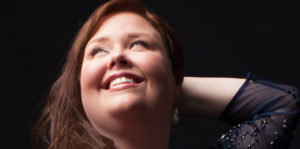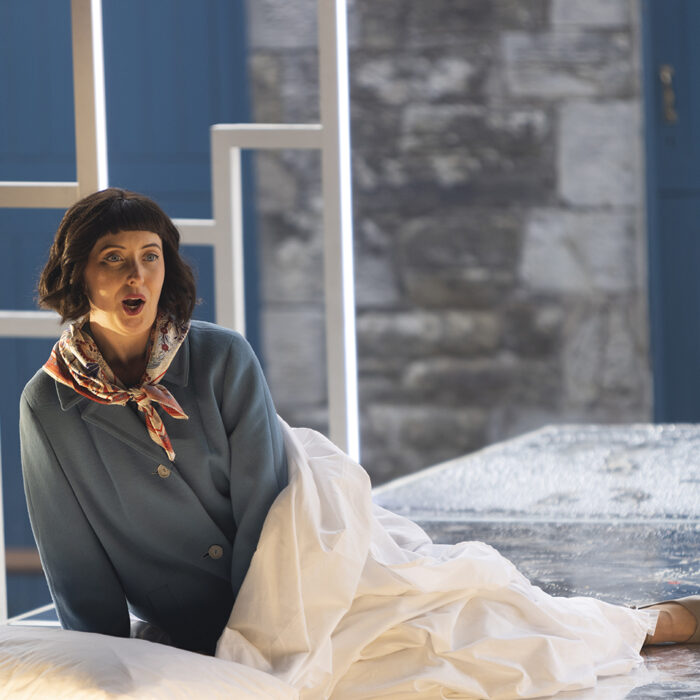
San Francisco Performances 2019-20 Review: Jamie Barton in Concert
Alongside Kathleen Kelly, Barton Delivers Mesmerizing Recital Honoring Female Composers
By Lois Silverstein(Credit: Fay Fox)
Mezzo-soprano Jamie Barton was the flame that lit a rainy night in San Francisco this past week. With Kathleen Kelly at the piano, she sang an eclectic concert on the subject of love, her powerful and sumptuous voice bringing pleasure and beauty to her entire audience.
It was glorious.
Barton announced during the concert that she and Kelly programmed the recital to emphasize female as well as male composers. “We are dedicated to it,” Barton said, well-known for this dedication as well as her desire to encourage more women to compose and create new musical expressions.
Barton began with “Heather,” a song by Elinor Remick Warren to a poem by Marguerite Wilkinson, but the concert also featured music by Haydn, Libby Larsen, Ravel, Nadia and Lily Boulanger, Duparc, Strauss, Amy Beach, and Heggie in the encore.
Haydn & Larsen
Her four selections from Haydn’s Cantata shone with dramatic intensity, with a characterization of a Greek Ariadne who had a rich private life. Beyond all the words of lament, there was a full-blooded woman who had a psychology as well as a voice.
From “Teseo mio ben!” through “Dove sei mio Tesoro (a tip to Mozart’s Countess”)” and the final “Ah, che morir vorrei,” we were beset by her emotional plight. Here we have not simply ardent musical beauty but 3-D life story.We fully expected her male lover to run out from the stage to defend himself and make a bid for her once again.
Moreover, Barton’s movement on stage – coming down stage arms extended with “He cannot be far away from me/Let me climb the steepest and highest cliff” and retreat after -well-articulated her pain and passion. She was also ready to attack him for his actions toward her, and when she did, the tempi accelerated, as did color, always maintaining the narrative arc. Her high register had shine and her lower voice showed sumptuousness.
Kelly played right with her too, her musical skill in seamless’ conjunction with Barton. The two artists were well-paired and together create more than words and more than story. Their breadth of knowledge in what to present was only bested by their skill in rendering it. It was a performance of thoughtful and deliberate mastery.
With Libby Larsen, audiences were given more than a woman scorned.
In “Love After 1950,” there are five songs about which Larsen wrote we have “a new-woman’s Frau, ‘Love’em and Leave’em.” “Boy’s Lips” featured a gorgeous evocation of those lips in “soft as baby’s skin,” the eros and emotional urgency palpable. The Torch song in “Blonde men” was erotic, and full of humor. During “I hate blonde men/before you break your heart,” Barton leaned on the piano like a veritable torch singer.
In “Big sister says,” the mezzo belted out “Beauty hurts,” “Looking good hurts,” something she paid homage to in this witty and eloquently performed piece. In “The Empty Song,” the audiences is given a great syncopation of the tango detailing her “Spanish Shampoo” and its “protein-rich” recipe for problem hair, all in the service of love and its need for allure. This is music that has weight as well as wit, not at all hard to relate to in either category. And with Muriel Rukeyser’s poem, “I Make My Magic” Barton/Kelly/Larsen gave us simply gorgeous tones, fully inhabited, with not one syllable skipped over.
Duparc, Strauss, & More
The beautiful “Phidylé” by Duparc seemed at once to float down from another planet in its shimmering longing while its earthy “o” sounds carefully sliced through that density. We had full-bodied longing and coupled with that Ravel’s “Chanson à boire,” the devilish Barton emerged with a tip to her sister “Carmen,” showed her taunting as well as dispensing beauty and meaning.
While we couldn’t wait for her “Cäcilie” by Strauss, Barton’s interpretation emphasized the choice for dramatic accent rather than the lyrical line. The result was that something felt amiss. It was interesting, but diffusing that particular beauty, was arguably the most disappointing moment of the evening.
In all of Larsen’s music, as well as Beach and Warren’s, the audience was treated to well-articulated diction in English; in Hayden’s carefully articulated Italian; the same could be said for her German in the Strauss. Meanwhile, in Ravel and Duparc, Barton’s diction was solid though occasional words were swallowed.
Barton knew how to get inside her audience’s state of mind – from moody to melancholy to down-right human and playful. She never skipped a beat and was always tasteful in her artistic choices. It was easy to be impressed with her intelligent rendering, never put off by the kaleidoscopic range.
Needless to say that the encore, Jake Heggie’s song “Of Gods and Cats,” was a masterpiece of performance. Barton’s purring and mincing brought the house down and Heggie, himself in the audience, stood to give her a well-deserved ovation.
Barton sang as Metropolitan Opera singer, Broadway theater performer and a cabaret “maestra” all at once. No sense hiding any of that light under a bushel. No question she brought radiance to San Francisco on Wednesday night, and she let it shine.


